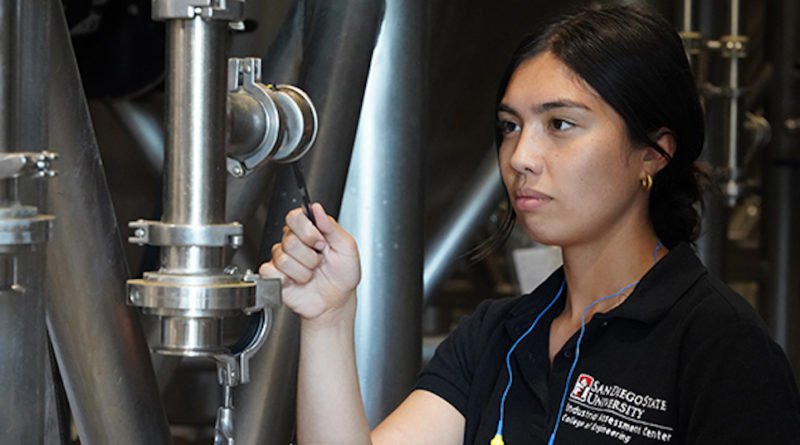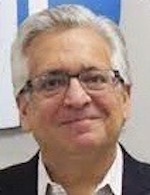Daily Business Report: Wednesday, Aug. 11, 2021
San Diego State University researchers
secure $141 million in funding for 2020-21
San Diego State University researchers secured $140.6 million in grant funding for 2020-21, maintaining the institution’s research enterprise in the midst of a global pandemic.
Nearly 320 principal investigators received 723 awards, including strong support in such crucial areas as boosting COVID-19 vaccine uptake, developing better batteries for electric cars, reducing disease among Hispanics, combating climate change and improving employment opportunities for people with disabilities.
Many research leaders also played the dual role of mentor, and hundreds of students participated in high-impact research projects last year.
More than 570 graduate students and 380 undergraduates participated in on-campus research in 2020-21, and the Division of Research and Innovation (DRI) financially supported more than 170 student researchers with grants. Roughly 300 students participated in the 2021 Student Research Symposium.
“This was an excellent year for a wide range of crucial research,” said Interim Vice President for Research and Innovation Hala Madanat. “SDSU faculty were ambitious in their efforts. From climate change to racial justice to artificial intelligence, their work addressed issues that are critical to our future.”
PHOTO: Undergraduate Kaylin Sabado performs an energy efficiency assessment with the SDSU Industrial Assessment Center.
Scripps Whittier Diabetes Institute receives
$3.1 million grant to study glucose monitoring
The National Institutes of Health have awarded a $3.1 million grant to the Scripps Whittier Diabetes Institute to study the use of wireless continuous glucose monitoring (CGM) devices among hospitalized patients with type 2 diabetes in hope of better controlling their blood sugar during their admission.
The new study will build on earlier research conducted by Scripps Whittier and on the subsequent use of CGM devices among patients with diabetes in Scripps Health hospitals during the COVID-19 pandemic. Early in the public health crisis, the Food and Drug Administration cleared the way for hospitals to use the devices to reduce the number of times a nurse must go into a patient’s room for more conventional finger pricks. Without CGM, nurses typically enter a patient’s room four to six times a day to check blood glucose levels.
Steve Kietz named chief executive
officer of Reliant Funding in San Diego
Reliant Funding, a small business finance company, has named Steve Kietz to the role of chief executive officer. Kietz previously served as the firm’s chief marketing officer. The industry veteran will guide Reliant Funding on its mission to continue providing world-class, customized finance solutions for American small businesses.
As CMO, Kietz was instrumental in expanding Reliant Funding’s marketing, risk and technology initiatives. He is a seasoned financial services professional with a more than 30-year track record of leading successful teams and is widely recognized as an industry leader in cultivating strategic partnerships.
Prior to joining Reliant, Kietz served as president of Inte Q, was founder and CEO of Mobile Money Ventures (which was acquired by Intuit), and held leading roles at Citi and JP Morgan, including president of Citibank Direct. Outside the profession, Kietz has volunteered as vice president of the Familial Dysautonomia Foundation for over 30 years.
SpaceLink and Blue Marble Communications
work on development of advanced optical terminals
SpaceLink, a company that is building an information superhighway for the space economy, announced that it formed a strategic partnership with San Diego-based Blue Marble Communications to accelerate development of advanced optical terminals.
Blue Marble is a supplier of high-performance, high-speed data, RF and optical communications components.
The terms of the deal between the two companies, valued at more than $10 million, include technological evolution and purchase of terminals for intersatellite links compatible with the Space Development Agency (SDA) standards. A diversified supply of terminals for optical intersatellite links helps SpaceLink manage risk and provide options for its customers.
HCAP Partners announces new
investment in Myndshft
HCAP Partners, a San Diego-based private equity firm and nationally recognized impact investor, announced its investment in Myndshft, a leading provider of real-time medical benefits check and electronic prior authorization technology. Terms of the investment were not disclosed.
Based in Mesa, Arizona, Myndshft develops real-time medical benefit check and electronic prior authorization software solutions for payers and providers.
“Enhancing access to care is a key investment theme for us at HCAP,” said Hope Mago, partner at HCAP Partners. “We have been impressed by Myndshft’s approach of leveraging artificial intelligence and blockchain technology to address a significant pain point in the health care space. We look forward to working with the Myndshft team during this time of significant company growth.”
Sydnexis secures $45 million Series B financing
led by Visionary Ventures and Blue Stem Capital
Sydnexis Inc., a clinical stage biopharmaceutical company with a proprietary formulation of low dose atropine for the treatment of progressive myopia, announced the completion of a $45 million Series B financing led by Visionary Ventures, Blue Stem Capital, and SC Master Fund, with participation from existing investors RA Capital Management, Longitude Capital, and Medicxi.
The financing will be used to fund Sydnexis’ lead candidate, SYD-101, through completion of the fully enrolled pivotal Phase 3 STAAR study for the treatment of progressive myopia in children.
Sydnexis’ STAAR study is the largest pediatric myopia study globally to investigate the use of low dose atropine to retard progressive myopia.
San Diego’s LifeWave offers relief
to victims of German floods
LifeWave, a San Diego-based health technology company, volunteered to provide care packages to the victims of the deadly floods that battered Western Germany in July. Flash floods destroyed homes, swept away roads, smashed dams, and quickly pushed rivers over their banks burying entire towns under heavy blankets of mud. 225 people died.
“When we got the call, we did not hesitate to lend a hand to help those battling the unprecedented flooding and fallout,” said Jim Caldwell, LifeWave’s chief marketing officer. “Our LifeWave team showed solidarity and support for our German friends, their families, and first responders with shipments of LifeWave products to help them combat stress, sleeplessness and overall discomfort.”
LifeWave manufactures wafer-thin, non-transdermal patches that harness frequencies of light to stimulate points on the skin to support energy, sleep, relaxation, and minor pain relief. The patches are portable, painless, effective, and easy-to-use.
Potential drug against COVID-19 found among tapeworm medications
A group of medications long prescribed to treat tapeworm has inspired a compound that shows two-pronged effectiveness against COVID-19 in laboratory studies, according to a new publication appearing online in the journal ACS Infectious Disease.
The compound, part of a class of molecules called salicylanilides, was designed in the laboratory of Professor Kim Janda, the Ely R. Callaway Jr. Professor of Chemistry and director of the Worm Institute for Research and Medicine at Scripps Research, in La Jolla.
“It has been known for 10 or 15 years that salicylanilides work against certain viruses,” Janda says. “However, they tend to be gut-restricted and can have toxicity issues.”
Janda’s compound overcomes both issues, in mouse and cell-based tests, acting as both an antiviral and an anti-inflammatory drug-like compound, with properties that auger well for its use in pill form.
Southwestern College’s student newspaper
named one of America’s top 100 publications
Southwestern College’s student newspaper, The Sun, was named as one of America’s Top 100 Publications by the Associated Collegiate Press (ACP). The prestigious designation was announced by ACP, the oldest college student journalism organization in North America, as part of a celebration of ACP’s 100th year.
The Sun was recognized alongside esteemed student publications from universities including Northwestern, Missouri, UCLA and USC. Since its inception, The Sun quickly became known for its high-quality coverage, securing its first Pacemaker Award from ACP for distinguished student journalism early in its existence. The Sun has consistently launched graduates into successful and high-profile journalism careers, including nearly every news organization in San Diego and national outlets like Politico.




